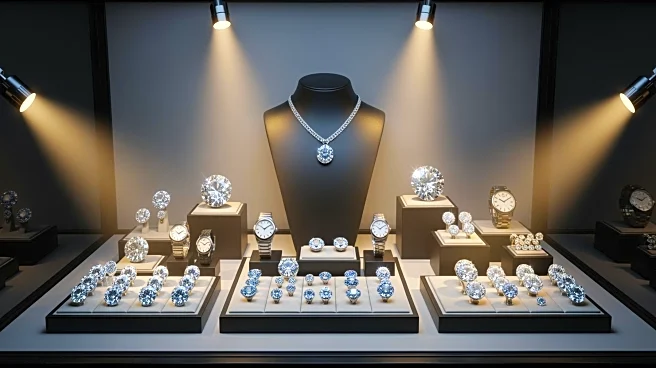What's Happening?
Richemont, a luxury goods company, has reported significant sales growth across various regions in the second quarter. Sales in the Americas increased by 20%, Europe by 11%, Asia-Pacific and Japan by 10%,
and the Middle East and Africa by 22%. The company attributes this growth to a shift in consumer mentality from 'YOLO' (you only live once) to 'YONO' (you only need one), where consumers are more discerning and focused on long-term value, particularly in jewelry. Despite the positive sales figures, Richemont remains cautious about the recovery in China, Hong Kong, and Macau, noting early signs of improvement but not yet a full recovery. Additionally, the Swiss watch industry faces challenges due to 39% tariffs imposed by the U.S. on Swiss imports since August.
Why It's Important?
Richemont's sales growth is significant as it reflects a broader trend of consumer behavior shifting towards quality and long-term value, which could influence luxury markets globally. The company's cautious approach to the Chinese market highlights ongoing uncertainties in one of the world's largest consumer bases. The U.S. tariffs on Swiss imports pose a challenge to the Swiss watch industry, potentially affecting trade relations and economic dynamics between the U.S. and Switzerland. These developments could impact luxury goods pricing and availability, influencing consumer choices and industry strategies.
What's Next?
Richemont's future strategy may involve navigating the complexities of international trade tariffs and adapting to changing consumer preferences. The Swiss government is expected to continue negotiations with the U.S. to address the tariff issue, which could lead to changes in trade policies affecting the luxury goods sector. Richemont may also focus on strengthening its presence in regions showing growth, while cautiously monitoring the recovery in China and other Asian markets.
Beyond the Headlines
The shift from 'YOLO' to 'YONO' mentality among consumers could signal a broader cultural change towards sustainability and mindful consumption, impacting marketing strategies and product development in the luxury sector. The ongoing tariff negotiations may also highlight the importance of diplomatic relations in global trade, influencing future economic policies and international business strategies.









